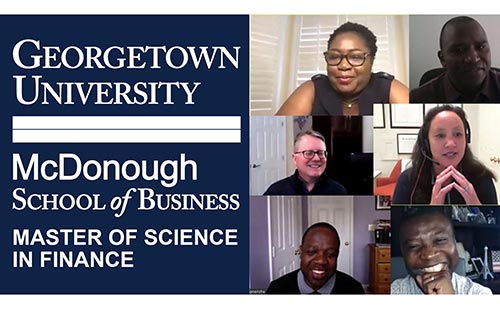
The Master of Science in Finance (MSF) program at Georgetown University’s McDonough School of Business launched a new Embassy Speaker Series to leverage the presence of the embassies in Washington, D.C., as students work to complete their Global Consulting Projects.
The series served as a way to strengthen the global connection and as an opportunity to learn about global business, trade, and diplomacy. Speakers included Malose Letsoalo, economic minister and Thilivhali Ratshitanga, political counselor South African Embassy; Petrina Nakale, trade and business development expert, Namibian Embassy; and Ricardo Añino, political counselor, and Christian Garma, economic and commercial counselor, Spanish Embassy.
“The Embassy speakers provided our students with on-the-ground and timely insights regarding their country,” said Luke Weichbrod, senior director of operations for the MSF Program. “Those insights provided our students with a deeper understanding for global business in a multicultural context.”
Letsoalo and Ratshitanga presented a case for investing in South Africa, speaking about its strong foreign investment presence and the world-class infrastructure to support growth and create a profitable economy. They took a particular interest in the opportunities across various sectors such as agriculture and agro-processing, manufacturing, and services, where they look to the United States for investments.
“We adopted an approach of presenting a business case for investing in South Africa, to assist students in their current or potential future responsibilities about opportunities in South Africa,” said Letsoalo. “But it also was important to receive feedback about issues of interest or concern about doing business in South Africa.”
The pandemic has created a surge of change across business practices in Namibia. Nakale discussed Namibia’s focus on greater technological advancements and creative thinking. Students working on projects involving affordable housing, multinational firms, agribusiness, and more were able to receive direct insight from Nakale into Namibian business culture and economic practices to best frame their presentations to meet their client’s needs.
“I was mostly surprised to find out that students are working on practical solutions to the development challenge issues that Namibia as a country is grappling with,” said Nakale. “It was a great opportunity to share small and medium enterprise (SME) development ideas from a Namibian perspective. My biggest takeaway was the interest and passion with which the students articulated issues and the projects they are working on with Namibian firms, and I was thrilled to provide a contextual understanding of the SME development environment in Namibia.”
Añino and Garma began their conversation by sharing a presentation on the Spanish economy and demographics, followed by Garma delving deeper into Spain’s investment partners and strategies – specifically the United States and Spain trade relationship.
“Georgetown University is very well known in my home country, especially since King Felipe VI of Spain graduated from Georgetown with a Master of Science in Foreign Service in 1995,” said Añino. “It was an honour to be able to participate in this global issues series, especially with a group of students eager to learn and potentially invest in my country someday.”
The Global Consulting Project is a six-week capstone course for second-year MSF students where they gain real-world experience consulting for a firm in another country. Drawing upon the knowledge they built throughout the program, student teams develop a consulting solution by researching the history, business, political, and regulatory environment of the client’s country, as they consult with the organization. The project concludes with a final presentation to their clients, which will be completed remotely this year due to the pandemic.
As students wrap up their projects and present to their clients, the knowledge and advice given by the embassy speakers provided first-hand insight into the cultures of the countries they are working for that research cannot replicate.
“Our goal is to provide graduating MSF students with an opportunity to use their business and finance skills in a real-world, global context,” said Allan Eberhart, senior associate dean for the MSF program and professor of finance. “It was our pleasure to host the embassies and have them engaged in a thoughtful discussion with our students.”
